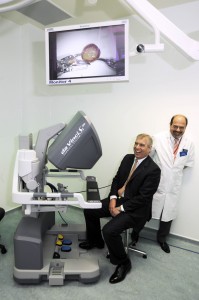Changes in the brain following amputation have been linked to pain arising from the missing limb, called ‘phantom pain’, in a study supported by the NIHR Oxford Biomedical Research Centre. Arm amputees experiencing the most phantom limb pain were found to maintain stronger representation of the ... READ MORE
New hope for those with Parkinson’s tremors
A NEW brain stimulation therapy could help supress tremors in people with Parkinson’s disease, according to new research. The non-invasive technique has been pioneered by researchers supported by the National Institute for Health Research (NIHR) Oxford Biomedical Research Centre, a collaboration ... READ MORE
New understanding of craniosynostosis will help families and treatment centres
RESEARCHERS in Oxford have discovered two new genetic causes of craniosynostosis - a rare bone condition that can inhibit brain growth in children. The work will give affected families much greater understanding of the condition and inform patient treatment plans. Andrew Wilkie, Nuffield ... READ MORE
Diabetes screening could happen at home
Research led by the University of Oxford has found that people may be able to test themselves for diabetes in the comfort of their own home, using a novel electronic screening device. The device was trialled in both healthy volunteers and people with diabetes, both in the home and in the ... READ MORE
Cannabis pain relief is variable
The pain relief offered by cannabis varies greatly between individuals, a brain imaging study supported by Oxford Biomedical Research Centre suggests. The researchers found that an oral tablet of THC, the psychoactive ingredient in cannabis, tended to make the experience of pain more bearable, ... READ MORE
Remodelling the Brain: an insight into research that could aid stroke recovery
Our brains adapt whenever we learn a new skill, such as juggling and they also adapt after damage such as stroke. In this Oxford Biomedical Research Centre public talk, Professor of Cognitive Neuroscience Heidi Johansen-Berg shows how brain imaging allows us to watch the brain remodel, reorganise ... READ MORE
Royal visit to Oxford’s Churchill Hospital
The Duke of York visited the Churchill Hospital in Oxford today to mark the opening of the new building. The building, that includes an integrated Cancer and Haematology Centre, provides a base for many NIHR Oxford Biomedical Research Centre projects. Chairman of Oxford University Hospitals ... READ MORE
TB’s genetic “family tree” may hold the key to tackling outbreaks quickly and effectively
NEW genetic sequencing techniques can map the “family tree” of a Tuberculosis (TB) outbreak allowing the spread of disease to be tackled quickly and effectively. Researchers, led by the NIHR Oxford Biomedical Research Centre, the Health Protection Agency in Birmingham and the Wellcome Trust ... READ MORE
Video encourages patients to participate in diabetes trial
A new video from the Diabetes Trials Unit (DTU) at the Oxford Centre for Diabetes, Endocrinology and Metabolism (OCDEM) is being launched today, on World Diabetes Day. Produced with local film company Nice Tree Films and funding from the NIHR Biomedical Research Centre in Oxford, the video ... READ MORE
Oxford spin-out provides software to monitor vital signs via webcam
A new Oxford spin-out, OxeHealth, spun out from Oxford’s Institute of Biomedical Engineering, will allow a patient’s health to be monitored using a webcam and a software application. The software will detect the patient’s heart rate, respiratory rate and oxygen saturation even in artificial light ... READ MORE
Genetic cause of insulin sensitivity offers diabetes clues
The first single gene cause of increased sensitivity to the hormone insulin has been discovered by a team of Oxford University researchers. The opposite condition – insulin resistance – is a common feature of type 2 diabetes, so finding this cause of insulin sensitivity could offer new ... READ MORE
High speed bench-top sequencing set to change the face of infection control
A study published today in BMJ Open, by researchers from Oxford, Leeds, Brighton and the Health Protection Agency, highlights the use of new bench-top DNA sequencers to quickly and cheaply unravel the entire genetic codes of bacteria causing life-threatening infections. This technology has the ... READ MORE
Gene therapy trial begins for blindness caused by choroideraemia
Professor Robert MacLaren from the University of Oxford and Professor Miguel Seabra from Imperial College London are undertaking a clinical trial using gene therapy to treat a disease that causes blindness known as choroideraemia. This condition is currently incurable and affects thousands of people ... READ MORE
Trial to investigate new drug combination in lung cancer
Cancer Research UK’s Drug Development Office has opened the first trial of a new drug combination in patients with advanced solid tumours and in a subset of patients who have non-small cell lung cancer. This trial will combine two compounds that aim to starve the tumours while simultaneously ... READ MORE
First electronic retina implanted in the UK
Surgeons in Oxford are the first in the UK to successfully implant an electronic retina into the back of an eye. On 22 March 2012, Chris James became the first patient in the UK to receive this ground-breaking surgery as part of a clinical trial being carried out at John Radcliffe Hospital and ... READ MORE
Can daily aspirin help prevent and treat cancer?
A collection of three papers (two published in The Lancet and one in The Lancet Oncology) add to the growing evidence base suggesting that daily aspirin can be used to help prevent and possibly treat cancer. All three papers are by Professor Peter Rothwell, University of Oxford and John Radcliffe ... READ MORE
Research@Oxford – Improving Health
On 14th March 2012 the NIHR Biomedical Research Centre and the Oxford Cancer Research Centre (right) hosted a public open day on research that is designed to improve health. A morning session was held for secondary schools, introducing them to the world of cancer research. Scientists, doctors, ... READ MORE
Genetic changes tracked as bacteria become a fatal infection
An unusual case could tell researchers more about the genetic changes that occur when a common bacteria, normally carried without any problems, on rare occasions causes potentially life-threatening infections. Eight mutations occurred in the common bacteria Staphylococcus aureus as it turned from ... READ MORE
Oxford research sheds new light on Clostridium difficile infection in hospitals
It has been a widely held belief that most C. difficile infections are spread in hospital from a case with active disease to other patients. A recent study, funded by the National Institute of Health Research, in Oxford and Leeds however shows that the vast majority of C. difficile cases in ... READ MORE
How has the pneumococcus bacteria evolved after the introduction of a childhood vaccine?
Researchers from the University of Oxford and the US Centers for Disease Control and Prevention (CDC) used the latest DNA sequencing techniques to investigate how pneumococcus bacteria evolved after the introduction of a childhood vaccine in 2000 in the USA. Streptococcus pneumoniae infections ... READ MORE
- « Previous Page
- 1
- …
- 27
- 28
- 29
- 30
- 31
- 32
- Next Page »

